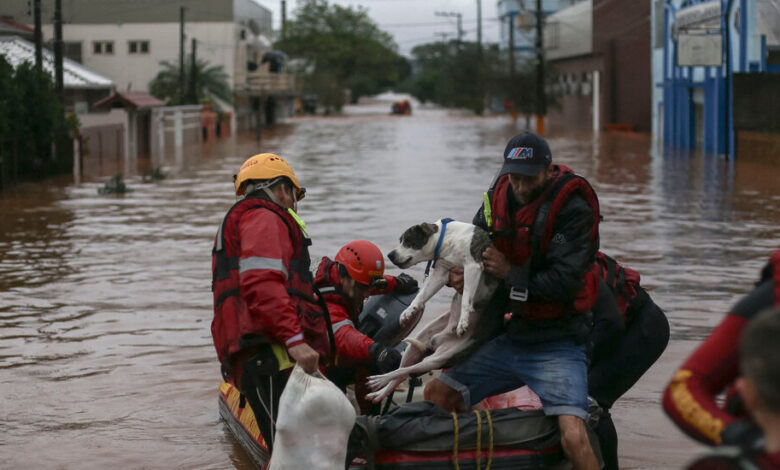After the floods, Brazil had an increase in homeless pets

When the two puppies arrived at the temporary shelter in the southern Brazilian city of Porto Alegre, their thin legs collapsed from exhaustion. They waded through the water for hours, fighting to survive as floods engulfed the city, turning streets into rivers.
“We tried to help them walk but they couldn’t,” said Dr. Daniel Guimarães Gerardi, a volunteer veterinarian at the shelter. “Your heart aches at times like these, because these poor animals are suffering.”
Two days after being rescued, the 6-month-old puppies – one tiger-striped, one jet black – mostly dozed on donated blankets along with chew toys, still exhausted from their ordeal . When they wake up, they stagger around the shelter on unsteady legs, their tails wagging and their ears covered tightly.
They were not wearing name tags and since they were found on May 21, no one has come looking for them. “We hope that, if they have someone to take care of them, they will be found,” Dr. Guimarães said. If not, he added, the aim would be to find them a good and safe home.
More than a month after the catastrophic floods devastated southern Brazil, the worst disaster in recent history, the region is still reeling. Flooding submerged entire towns, destroyed bridges, closed an international airport and forced nearly 600,000 people across Rio Grande do Sul state to evacuate. At least 169 people died and 56 people are still missing.
Amid the chaos, thousands of animals were separated from their owners and trapped in floods. Dramatic scene of dogs struggling to save themselves Climb on the roofs flooded houses and firefighters rescuing stranded animals, including a horse named Caramelo, has attracted attention around the world. (Caramelo was finally reunited with its owner.)
Even as floodwaters recede, tens of thousands of people remain in temporary shelters, unable to return to destroyed or damaged homes. And more than 12,500 pets have been rescued since the start of the crisis, according to state authorities.
Fabiana de Araújo Ribeiro, manager of Porto Alegre’s animal protection office, said many of these animals have no owners.
Even if they did, Ms. Ribeiro said, “they have nowhere to turn to” because their homes were destroyed.
And with water levels covering street signs and house numbers, rescue teams have struggled to record exactly where pets were rescued or who they might belong to.
Animal homelessness increases frequently after natural disasters around the world, when owners are killed, separated from their pets or forced into temporary shelters that do not allow animals. object in.
However, returning displaced animals is more complicated in countries like Brazil than in the United States, where best practices often include methodically registering where animals were found and establishing hotline focused on helping owners find pets, said Joaquin de la Torre Ponce, Latin America regional director. International Fund for Animal Welfare, a nonprofit organization based in Washington.
Animal rights advocates say it’s also much more common in the United States for owners to implant tracking chips in their pets than in many parts of Latin America, making reunification easier.
Strays are more common in Latin America, where animals are often fed and cared for by an entire compound, Ponce said.
“These community dogs and cats don’t have a specific owner,” he said. “So no one will come looking for them in a situation like this.”
Under the leaky roof of an abandoned warehouse in Canoas, a city neighboring Porto Alegre, about 800 rescued dogs crawl, whimper and bark in makeshift kennels built from wooden pallets.
This space has been transformed into an impromptu shelter by volunteers, who are working in shifts to check in, feed, administer medicine and care for the animals. Few of the animals have names, but each crate has a number scribbled on cardboard by shelter workers.
Many people were saved by rescue teams after days, even weeks, of being stuck on rooftops, in trees and in flooded houses. Some arrived injured or sick, and most were severely malnourished.
A few, like Gigante, an elderly Labrador wearing a pink shirt with a red heart printed on it, were abandoned by their owners who were forbidden from taking their pets to what is now a temporary shelter. they call home.
In one corner, a muscular white-brown hybrid dog was pulling on the chain, baring its sharp teeth. Volunteers said he has almost recovered from the wound to his muzzle, but he has been nervous since floodwaters flooded his house and sent his owner to the hospital.
Deeper in the warehouse, a gentle Rottweiler was curled up in the back corner of the kennel, his head resting on his legs. Two weeks ago, firefighters found him swimming in the streets of Canoas, shaking and agitated.
In recent days, another heavy rain caused chaos at the shelter. When the downpour began, the dogs tried to climb onto the roof of their cage. “They feel nervous when they see water,” said Celso Luis Vieira, 74, a volunteer. “They thought the place was going to flood.”
On a recent weekday morning, Sérgio Hoff was searching the warehouse for his missing pets. When he evacuated his home in Canoas with his wife and 9-year-old daughter in early May, the family had to leave behind five dogs and three cats.
“My wife panicked; she didn’t want to leave them,” said Mr. Hoff, 39, a bank employee. “But we can’t take them with us. It was chaos.”
The family let the animals loose in the yard in the hope they would climb to higher ground if the water rose. They never imagined floodwaters would submerge their entire house.
Mr. Hoff eventually found his two dogs at a shelter on the other side of Canoas, which gave him hope that the others might also survive. However, after weeks of searching other animal shelters and scouring social media sites, he still had not found the remaining pets.
“Frustration is the only word to describe this,” he said after another unsuccessful visit to the shelter. “But we won’t give up.”
Back at the shelter in Porto Alegre, a 2-year-old black mixed-breed dog named Ticolé had better luck.
Frightened by the water rushing into the neighborhood, the dog fled the house and escaped just as its owner was preparing to flee. After two weeks, its owner, Jorge Caldeira Santos, finally found its trace.
“I found him,” he said as he led Ticolé out of the shelter.




